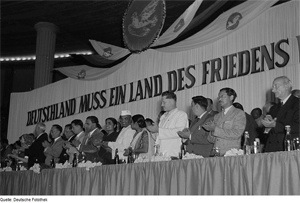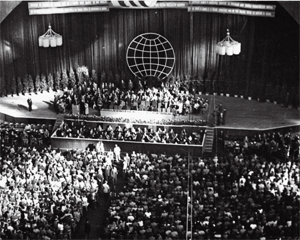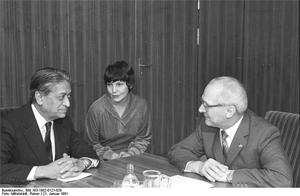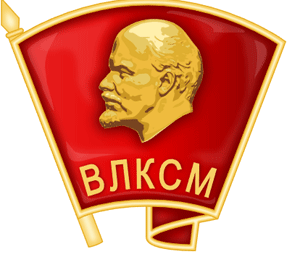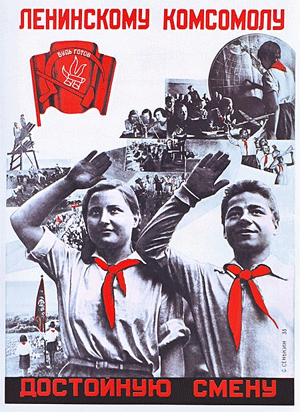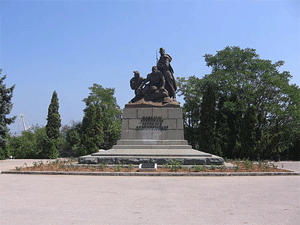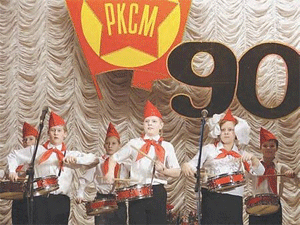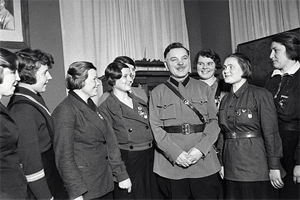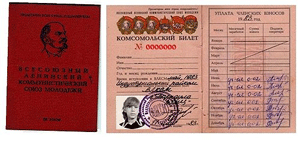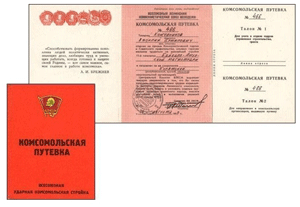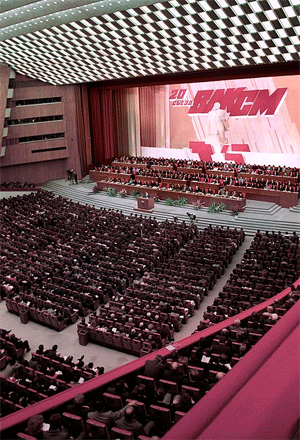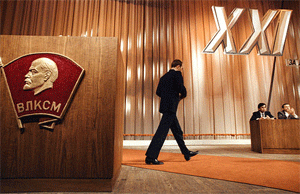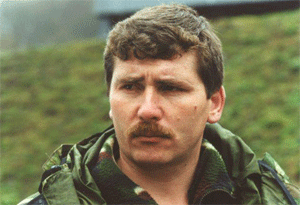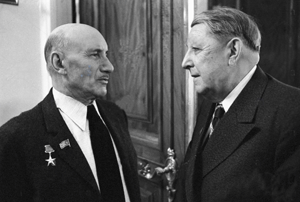Hans Günter Brauch Download Section
AFES-PRESS
The copyright of all text in this section remains with the author or original copyright holder. For copyright reasons it is not permitted to store these texts in data bases, to use them for commercial purposes, or to post them on other websites. However, links to these papers on other websites are possible with the permission of AFES-PRESS.
NOTICE: THIS WORK MAY BE PROTECTED BY COPYRIGHT
YOU ARE REQUIRED TO READ THE COPYRIGHT NOTICE AT THIS LINK BEFORE YOU READ THE FOLLOWING WORK, THAT IS AVAILABLE SOLELY FOR PRIVATE STUDY, SCHOLARSHIP OR RESEARCH PURSUANT TO 17 U.S.C. SECTION 107 AND 108. IN THE EVENT THAT THE LIBRARY DETERMINES THAT UNLAWFUL COPYING OF THIS WORK HAS OCCURRED, THE LIBRARY HAS THE RIGHT TO BLOCK THE I.P. ADDRESS AT WHICH THE UNLAWFUL COPYING APPEARED TO HAVE OCCURRED. THANK YOU FOR RESPECTING THE RIGHTS OF COPYRIGHT OWNERS.
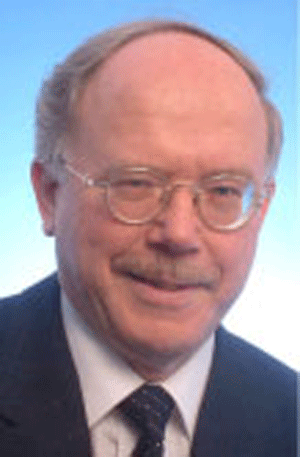
PD Dr. Hans Günter Brauch, FU Berlin (Ret.), UNU-EHS, Bonn; AFES-PRESS chairman; Editor, Hexagon Book Series (HESP), Springer Briefs on Pioneers in Science and Practice (PSP) and SpringerBriefs in Environment, Security, Development and Peace (ESDP), Springer Publishers
Since 1987 chairman of Peace Re¬search and European Security Studies (AFES-PRESS), since 2005 fellow at the Institute on Environment and Human Security of the United Nations University (UNU-EHS), he was Adj. Prof. (Privatdozent) at the Faculty of Political Science and Social Sciences, Free University of Berlin (Ret. since 2012). He was guest professor of international relations at the universities of Frankfurt on Main, Leipzig and Greifswald and at the teachers training college in Erfurt and since 2012 visiting professor at the National University of Malaysia (2010, 2012) and at Chulalongkorn University, Bangkok, Thailand (2012, 2013-2014). From 1976-1989 he was research associate at Heidelberg and Stuttgart universities, a research fellow at Harvard and Stanford University and he was also teaching at the universities of Darmstadt, Tübingen, Stuttgart and Heidelberg. He also taught at SciencePo, Paris (2010-2012), at the European Peace University(EPU) in Austria (1999-2001, 2009-2012) and at the University of Arhus (2012)
He is coeditor of: Security and Environment in the Mediterranean (2003); Globalization and Environmental Challenges (2008); Facing Global Environmental C Change (2009); Coping with Global Environmental Change, Disasters and Security (2010); Climate Change,Human Security and Violent Conflict: Challenges for Societal Stability (2012), Expanding Peace Ecology: Security, Sustainability, Equity and Peace: Perspectives of IPRA’s Ecology and Peace Commission and of Handbook on Sustainability Transition and Sustainable Peace (2015).
Topical Comments on International Issues
Reports
Keynote Addresses and Presentations
2002
2003
2004
2005
2006
2007
2008
2009
2010
2011
2012
2013
2014
2015
2016
2017
Publications
New publications during 2016 as the Editor of
Hexagon Book Series on Human and Environmental Security and Peace (HESP)
Vol. 10: Hans Günter Brauch, Úrsula Oswald Spring, John Grin, Jürgen Scheffran (Eds.): Handbook on Sustainability Transition and Sustainable Peace (Heidelberg – New York – Dordrecht – London: Springer-Verlag, 2016).
Vol. 12: Charlène Cabot: Climate Change, Security Risks, and Conflict Reduction in Africa: A Case Study of Farmer-Herder Conflicts over Natural Resources in Côte d’Ivoire, Ghana, and Burkina Faso (Berlin – Heidelberg – New York: Springer, 2016).
Vol. 13: Jeroen Kool: Sustainable Development in the Jordan River Valley: Final Report of the Regional NGO Master Plan (Berlin – Heidelberg – New York: Springer, 2016).
Springer Briefs in Environment, Security, Development and Peace (ESDP)
Vol. 5: Mansoureh Ebrahimi: The British Role in Iranian Domestic Politics (1951-1953) (Heidelberg – Dordrecht – London – New York: Springer-Verlag, 2016).
Vol. 22: Cecilia Ng (Ed.): Gender Responsive and Participatory Budgeting: Imperatives for Equitable Public Expenditure (Cham– New York – Heidelberg – Dordrecht – London: Springer International Publishing, 2016).
Vol. 23: Rosario H. Pérez-Espejo, Roberto M. Constantino-Toto, Hilda R. Dávila-Ibáñez (Eds.): Water, Food and Welfare: Water Footprint as a Complementary Approach to Water (Cham– New York – Heidelberg – Dordrecht – London: Springer International Publishing, 2016).
Vol. 24: Thanh-Dam Truong, Karim Knio: The South China Sea and Asian Regionalism - A Critical Realist Perspective (Cham – New York – Heidelberg – Dordrecht – London: Springer International Publishing, 2016).
Vol: 25: Hayashi, Y., Yasunari, T., Kanzawa, H., Katoh, H. (Eds.): Climate Change, Energy Use, and Sustainability Diagnosis and Prescription after the Great East Japan Earthquake (Cham – Tokyo - Heidelberg – New York – Dordrecht – London: Springer-Verlag, 2016).
Vol: 26: Liana Ricci: Reinterpreting Sub-Saharan Cities through the Concept of Adaptive Capacity: An Analysis of Autonomous Adaptation in Response to Environmental Changes in Peri-Urban Areas (Cham– New York – Heidelberg – Dordrecht – London: Springer International Publishing, 2016).
Vol: 27: Ana Elizabeth Jardón Hernández: International Migration and Crisis: Transition toward a New Migratory Phase (Cham– New York – Heidelberg – Dordrecht – London: Springer International Publishing, 2016).
Vol: 28: Supang Chantavanich, Aungkana Kamonpech (Eds.): Refugee and Return: Displacement along the Thai-Myanmar Border (Cham– New York – Heidelberg – Dordrecht – London: Springer International Publishing, 2016).
Vol: 30: Su Bin, Elspeth Thomson (Eds.): Opportunities and Challenges in China’s Energy Development (Cham – New York – Heidelberg – Dordrecht – London: Springer International Publishing, 2016).
Vol: 31: Su Bin, Elspeth Thomson (Eds.): China's Energy Efficiency and Conservation: Household Behaviour, Legislation, Regional Analysis and Impacts (Cham – New York – Heidelberg – Dordrecht – London: Springer International Publishing, 2016).
Springer Briefs on Pioneers in Science and Practice (PSP)
Vol. 29: Nils Petter Gleditsch: Nils Petter Gleditsch: Pioneer in the Analysis of War and Peace (Cham – Heidelberg – New York – Dordrecht – London: Springer, 2016).
Vol. 50: Paul J. Crutzen, Hans Günter Brauch (Eds.): Paul J. Crutzen: A Pioneer on Atmospheric Chemistry and Climate Change in the Anthropocene (Cham – Heidelberg – New York – Dordrecht – London: Springer International Publishing, 2016).
Vol. 52 Richard D. Knowles, Céline Rozenblat (Eds.): Sir Peter Hall: Pioneer in Regional Planning, Transport and Urban Geography (Cham – Heidelberg – New York – Dordrecht – London: Springer International Publishing, 2016).
Two New Book Series Launched in 2016
The Anthropocene Politik – Economics – Society – Science (APESS)
Vol. 2: Maja Göpel: The Great Mindshift: How a New Economic Paradigm and Sustainability Transformations go Hand in Hand (Cham – Heidelberg – New York – Dordrecht – London: Springer International Publishing, 2016).
Vol. 3: Audley Genus (Editor): Sustainable Consumption: Design, Innovation and Practice (Cham – Heidelberg – New York – Dordrecht – London: Springer International Publishing, 2016).
Vol. 4: Hans Günter Brauch, Úrsula Oswald Spring, Juliet Bennett, Serena Eréndira Serrano Oswald (Eds.): Addressing Global Environmental Challenges from a Peace Ecology Perspective (Cham – Heidelberg – New York – Dordrecht – London: Springer International Publishing, 2016).
Vol. 5: Úrsula Oswald Spring, Hans Günter Brauch, Serena Eréndira Serrano Oswald, Juliet Bennett (Eds.): Regional Ecological Challenges for Peace in Africa, the Middle East, Latin America and Asia Pacific (Cham – Heidelberg – New York – Dordrecht – London: Springer International Publishing, 2016).
Vol. 8: David Curran: More than Fighting for Peace? The Role of Conflict Resolution in Training Programmes for Military Peacekeepers (Cham – Heidelberg – New York – Dordrecht – London: Springer International Publishing, 2016).
Vol. 9: Heather Devere - Kelli Te Maihāroa - John Synott (Eds.): Peacebuilding and the Rights of Indigenous Peoples Experiences and Strategies for the 21st Century (Cham – Heidelberg – New York – Dordrecht – London: Springer International Publishing, 2016).
Pioneers in Arts, Humanities, Science, Engineering, Practice (PAHSEP)
Vol. 1: Louis Kriesberg: Louis Kriesberg: Pioneer in Peace and Constructive Conflict Resolution Studies (Cham – Heidelberg – New York – Dordrecht – London: Springer International Publishing, 2016).
Vol. 2: Richard Ned Lebow (Ed.): Richard Ned Lebow: A Pioneer in International Relations Theory, History, Political Philosophy and Psychology (Cham – Heidelberg – New York – Dordrecht – London: Springer International Publishing, 2016).
Vol. 3: Richard Ned Lebow (Ed.): Richard Ned Lebow: Major Texts on Methods and Philosophy of Science (Cham – Heidelberg – New York – Dordrecht – London: Springer International Publishing, 2016).
Vol. 4: Richard Ned Lebow (Ed.): Richard Ned Lebow: Key Texts in Political Psychology and International Relations Theory (Cham – Heidelberg – New York – Dordrecht – London: Springer International Publishing, 2016). Richard Ned Lebow: Essential Texts on Classics and History and Ethics and International Relations
Vol. 5: Richard Ned Lebow (Ed.): Richard Ned Lebow: Essential Texts on Classics and History and Ethics and International Relations (Cham – Heidelberg – New York – Dordrecht – London: Springer International Publishing, 2016).
Vol. 8: J. Russell Boulding (Ed.): Elise Boulding: Writings on Feminism, the Family and Quakerism (Cham – Heidelberg – New York – Dordrecht – London: Springer International Publishing, 2016).
Vol. 13: Herbert C. Kelman and Ronald J. Fisher (Eds.): Herbert C. Kelman: Pioneer in the Social Psychology of Conflict Analysis and Resolution (Cham – Heidelberg – New York – Dordrecht – London: Springer International Publishing, 2016).
Vol. 14: Ronald J. Fisher: Ronald J. Fisher: A North American Pioneer in Interactive Conflict Resolution (Cham – Heidelberg – New York – Dordrecht – London: Springer International Publishing, 2016).
New Books by Hans Günter Brauch published with several co-editors in 2016
HEXA-GON Series Vol 10: Hans Günter Brauch, Úrsula Oswald Spring, John Grin, Jürgen Scheffran (Eds.): Handbook on Sustainability Transition and Sustainable Peace. Hexagon Series on Human and Environmental Security and Peace 10 (Heidelberg – New York – Dordrecht – London: Springer-Verlag, 2016).
ISBN: 978-3-319-43882-5 (Print)
ISBN: 978-3-319-43884-9 (Online)
DOI 10.1007/978-3-319-43884-9
APESS Vol 4 " Hans Günter Brauch, Úrsula Oswald Spring, Juliet Bennett, Serena Eréndira Serrano Oswald (Eds.): Addressing Global Environmental Challenges from a Peace Ecology Perspective (Cham–Heidelberg– New York – Dordrecht – London: Springer-Verlag, 2017).
ISBN: 978-319- (Softcover)
ISBN: 978-319- (EBook)
Doi: 10.1007/978-319-_ (add chapter no.)
APESS Vol 5: Úrsula Oswald Spring, Hans Günter Brauch, Serena Eréndira Serrano Oswald, Juliet Bennett (Eds.): Regional Ecological Challenges for Peace in Africa, the Middle East, Latin America and Asia Pacific (Cham– New York – Heidelberg – Dordrecht – London: Springer International Publishing, 2017).
ISBN: 978-319- (Softcover)
ISBN: 978-319- (EBook)
Doi: 10.1007/978-319-_ (add chapter no.)
Latest published Books
Chinese Edition of Selected Chapters published by Nanjing Press Company
With the financial support for the translation of the Nanjing Peace Museum in Nanjing
Hans Günter Brauch, Úrsula Oswald Spring, Czeslaw Mesjasz, John Grin, Liu Cheng (Eds.): Globalization and
Environmental Challenges: Reconceptualizing Security in the 21st Century
ISBN: 978-7-5533-0731-2
Nanjing Press Company,
Nanjing, China,
February 2015,
348 pages
Hans Günter Brauch, Úrsula Oswald Spring, Czeslaw Mesjasz, John Grin, Liu Cheng (Eds.): Facing Global
Environmental Change: Environmental, Human, Energy, Food, Health and Water Security Concepts
ISBN: 978-7-5533-0652-0
Nanjing Press Company,
Nanjing, China,
February 2015,
364 pages
Hans Günter Brauch, Úrsula Oswald Spring, Czeslaw Mesjasz, John Grin, Liu Cheng (Eds.): Coping with Global
Environmental Change, Disasters and Security Threats, Challenges, Vulnerabilities and Risks
ISBN: 978-7-5533-0656-8
Nanjing Press Company,
Nanjing, China,
February 2015,
406 pages
In Spanish
Úrsula,Oswald Spring, Serena Eréndira Serrano Oswald, Fátima Flores Palacios, Maribel Ríos Everado, Hans Günter Brauch, Teresita Ruiz Pantoja, Carlos Lemus Ramírez, Mónica Cruz Rivera (2013). Vulnerabilidad Social y Género entre Migrantes Ambientales, CRIM-DGAPA-UNAM Cuernavaca. ISBN: 978-607-02-5890-9.
Reseña: La migración inducida ambientalmente (MIA) es un proceso complejo que está influido por factores económicos, sociales, culturales, demográficos, políticos y ambientales. Este libro analiza teórica y empíricamente la MIA en el transecto desde el Popocatépetl, pasando por los valles centrales hasta la Sierra Madre del Sur, en la parte central de México. Generalmente, las teorías sobre la migración enfatizan en los aspectos económicos, sociales y demográficos en el lugar de origen o destino y pocas veces incluyen elementos ambientales.
El libro examina de manera multidisciplinaria los factores de expulsión, de atracción y de mediación que llevan a una persona, familia o comunidad a emprender el camino hacia otro destino y su punto nodal se centra en la interrelación entre los aspectos ambientales, agroproductivos, comunitarios y psicosociales.
La discusión teórica de la MIA se ordenó a partir de tres ejes centrales: migración y desarrollo; migración y ambiente; y migración y seguridad. La MIA está sujeta a componentes temporales de largo alcance, como los impactos del cambio ambiental global y del cambio climático, a situaciones y políticas de mediano plazo, en las que predominan las políticas económicas de apertura comercial mediante el Tratado de Libre Comercio con América del Norte, y a coyunturas, entre las que destacan los eventos hidrometeorológicos extremos, las cíclicas crisis económicas y los cambios en la política social y rural sexenal. Al conjuntar los factores interactuantes de la MIA, se encontró una doble vulnerabilidad: la ambiental y la social.
Este libro colectivo hace ver que una política compleja que integre factores estructurales de largo, mediano y corto plazo podría reducir la migración ambientalmente inducida y crear condiciones de seguridad humana, de género y ambiental en el medio rural, no sólo en Morelos, sino en México y más allá.
In English
Hans Günter Brauch – Teri Grimwood: Jonathan Dean: Pioneer in Détente in Europe, Global Cooperative Security Arms Control and Disarmament – Presented by Hans Günter Brauch. SpringerBriefs on Pioneers in Science and Practice No. 19 (Cham – Heidelberg – New York – Dordrecht – London: Springer-Verlag, 2015).
ISBN (Print): 978-3-642
ISBN (Online/eBook): 978-3-642
DOI: 10.1007/978-3-642-
Republication of a book chapter as chapter 1 in the following Handbook
Úrsula Oswald Spring and Hans Günter Brauch: “Securitizing Water”, in: H. G. Brauch, Ú. Oswald Spring, J. Grin, C. Mesjasz, P. Kameri-Mbote, N. Chadha Behera, B. Chourou, H.Krummenacher (Eds.): Facing Global Environmental Change: Environmental, Human, Energy, Food, Health and Water Security Concepts (Berlin – Heidelberg – New York: Springer-Verlag, 2009): 175-202
Úrsula Oswald Spring and Hans Günter Brauch: “Securitizing Water”, in: Anders Jägerskog, Ashok Swain, Joakim Öjendal (Eds.): Water Security (4 vol. set), vol. 1: Water Security - Origin and Foundations (London: SAGE Publications, November 2014): 1-44
Latest own Book
Ursula Oswald Spring; Hans Günter Brauch; Keith G. Tidball (Eds.): Expanding Peace Ecology: Security, Sustainability, Equity and Peace: Perspectives of IPRA’s Ecology and Peace Commission 1. SpringerBriefs in Environment, Security, Development and Peace, vol. 12. Peace and Security Studies No. 2 (Cham – Heidelberg – New York – Dordrecht – London: Springer-Verlag, 2014).
ISBN (Print): 978-3-319-00728-1
ISBN (Online/eBook): 978-3-319-00729-8
DOI: 10.1007/978-3-319-00729-8
Topical Comments on International Issues
Topical Interviews
Hans Guenter Brauch: Interview with Washington Profile, 2 April 2004, Center for Defense Information, Washington, D.C., on Climate Change and Conflicts, in English and in Russian (distributed to major media in the Russia)
Hans Günter Brauch: Interview with Thüringer Allgemeine, Erfurt, 20 March 2003 on the U.S. debate on the costs of the Iraq war (pdf-file, 97 KB)
Reports
European Institute of the Mediterranean, Barcelona, April 2010
Hans Günter Brauch, Úrsula Oswald Spring
UNCCD, May 2009
Securitizing the Ground-Grounding Security
Download English version (United Nations Convention to Combat Desertification: 404 Page not found)
Úrsula Oswald Spring , Hans Günter Brauch
UNCCD, May 2009
Seguritizar la Tierra Aterrizar la Seguridad
World in Transition – Climate Change as a Security Risk
German Advisory Council on Global Change, Earthscan, London 2008
Summary:
Commissioned Expert's Studies . For this Report, the Council has commissioned expert's studies, which are available for download (in German only): Expert Study by AFES-PRESS written by: Hans Günter Brauch: Regional expert study: Destabilising and Conflict Potential of projected Environmental Changes in the Region of Southern Europe and North Africa [In German: Regionalexpertise: Destabilisierungs- und Konfliktpotential prognostizierter Umweltveränderungen in der Region Südeuropa und Nordafrika bis 2020/2050.
Ben Wisner, Maureen Fordham, Ilan Kelman, Barbara Rose Johnston, David Simon, Allan Lavell, Hans Günter Brauch, Ursula Oswald Spring, Gustavo Wilches-Chaux, Marcus Moench, and Daniel Weiner: Policy Memorandum by Scientists regarding the UN Security Council’s first discussion on Climate Change : Climate Change and Human Security]
The first issue of "Studies Of University: Research, Counsel, Education" (SOURCE) of UNU-EHS: "Threats, Challenges, Vulnerabilites and Risks in Environmental and Human Security" by Hans Günter Brauch is available for download here (United Nations University, Institute for Environment and Human Security: Latvia. ProSUM: Prospecting secondary raw materials in the urban mine and mining waste) Orders and inquires of the printed version, please address to Roberts@ehs.unu.edu
Second issue of "InterSecTions. Interdisciplinary Security Connections" is now available. No. 2/ 2005: Environment and Human Security.. Towards Freedom from Hazard Impacts. Hans Günter Brauch. February 2005. ISBN: 3-9810200-3-0 (PDF version) Download (United Nations University, Institute for Environment and Human Security: Pakistan. PMCII: Developing a Disaster Risk Insurance Framework for Pakistan) Intersections are distributed free of charge. For a printed version (ISBN: 3-9810200-2-2), please contact: Ilona Roberts, Information Assistant, United Nations University, Institute for Environment and Human Security (UNU-EHS), Görresstr. 15 Phone: (0049)(0) (228) 422855-02, D-53113 Bonn Fax: (0049)(0) (228) 422855-99, E-mail: roberts@ehs.unu.edu
Hans Günter Brauch: "Climate Change, Environmental Stress and Conflict - AFES-PRESS Report for the Federal Ministry for the Environment, Nature Conservation and Nuclear Safety", in: Federal Ministry for the Environment, Nature Conservation and Nuclear Safety (Ed.): Climate Change and Conflict. Can climate change impacts increase conflict potentials? What is the relevance of this issue for the international process on climate change? (Berlin: Federal Ministry for the Environment, Nature Conservation and Nuclear Safety, 2002): 9-112.
Keynote Addresses and Presentations
2017
31 May 2017
Mittwoch, den 31.5.2017,
Empfang ab 19:00 und Vorträge ab 19:30-21:00
Rathaussaal der Stadt Mosbach
Buchvorstellung und Buchübergabe
Handbuch zum Übergang zur Nachhaltigkeit
und zum nachhaltigen Frieden
Book Launch of the
Handbook on Sustainability Transition and Sustainable Peace
Programme (access to podcasts)
Programm und Zugang zu den Podcasts
and Book Donation
on the Occasion of the
70th Birthday of Hans Günter Brauch
Heiko Schattauer, RNZ, 1 June 2017>
for the
Mediathek Mosbach
and Search
and Library of the
Nicolaus-Kistner Gymnasium in Mosbach (Germany)
Report in Frank Heuß, RNZ, 7 June 2017
31 May 2017
Nobel Laureate Prof. Dr. Paul Crutzen
Signing into the Golden Book of the town of Mosbach (in German)
Photos
Heiko Schattauer, RNZ, 1 June 2017
February, 2017
22-24 February, 2017, Strasbourg, France
European Science Foundation
Participation at a Reviewers’ Meeting in the Social Sciences
January, 2017
11-14 January, Mexico City, Mexico
10th International Congress of the Latin American Council of Peace Research
Website with Background documentation
Programme of the CLAIP Congress
Scientific Committee
[x]
Photo after the Opening Session (from left to right), Profesores Nielsen de Paula Pires (Brazil), Miguel Concha (Mexico), Luis Alberto Padilla (Guatemala), María Tresa Muñoz (Argentina), Margarita Veláquez (Mexico), Francisco Rojas (Chile), Diana de la Rúa (Argentina), Úrsula Oswald Spring (Mexico), Alberto Vital (Mexico), Hans Günter Brauch (Germany), Howard Richards (USA), S. Eréndira Serrano (Mexico), Azril Bacal (Peru/ Sweden).
[x]
Private Dinner of Key Conference Participants in Coyoacan, Mexico City, 15 January 2017 (showing from left to right): Luis Alberto Padilla (Guatemala), Hans Günter Brauch (Germany), Francisco Rojas (Chile), Úrsula Oswald Spring (Mexico), María Tresa Muñoz (Argentina), Nielsen de Paula Pires (Brazil), Daniel and Diana de la Rúa (Argentina), Luis Medina and S. Eréndira Serrano (Mexico), Laura Balbuena (Peru).
2-8 January, 2017
Archaeological visit to Maya sites in Campeche and Quintana Roo
(Campeche, Calakmul, Becan, Kohunlich, Muyil)
[x]
Map of the Mexican states of Campeche and Quintana Roo
[x] [x] [x] [x] [x] [x]
7 January 2017, Visit of a Biospheric reservation south of the Playa del Carmen near Muyil and Tulum, Quintana Roo, Mexico.
[x] [x]
7 January 2017, Archaeological Site in Muyil, Quintana Roo, Mexico.
[x]
5 January 2017, Archaeological site, Kohunlich, Quintana Ro, Mexico
[x]
5 January 2017, Archaeological site, Becan, Quintana Roo, Mexico
[x]
4 January 2017, Archaeological site, Calakmul, Campeche
[x]
3 January 2017, Hans Günter Brauch climbing a temple at Edzna, Campeche, Mexico
[x]
3 January 2017, Archaeological Site, Edzna, Campeche, Mexico
[]x
Our travel group from Mexico, Argentina, Germany and Switzerland on 2 January 2017 which started the tour of archaeological sites in Campeche, Campeche, Mexico
2016
27 November - 3 December 2016
IPRA, Freetown, Sierra Leone
26th IPRA General Conference
On AGENDA FOR PEACE AND DEVELOPMENT
Conflict Prevention, Post-Conflict Transformation, and
the Conflict, Disaster Risk and Sustainable Development Debate
Report on the conference in: IPRA Newsletter, 2016, vol 6, no. 4
27th November – 1st December 2016
Freetown, Sierra Leone
THERE IS SO MUCH IN US THAT UNITES US THAN DIVIDES US AS SIERRA LEONEANS. WE MUST RECOGNIZE THIS FACT AND LEARN TO LIVE WITH ONE ANOTHER. -- MAJOR GENERAL ALFRED NELSON-WILLIAMS
UNIVERSITY OF SIERRA LEONE
[X]
28 November 2016
[X]
Opening session of the IPRA Conference, 28 November 2016 with the Vice President and high representatives of the University of Sierra Leone.
IPRA’s Ecology and Peace Commission
[x]
View from the meeting room of the Ecology and Peace Commission on parts of Freetown, Sierra Leone.
Monday, 28 November 2016, Session 1: Opening Session: IPRA Book Launches
[X]
Photo from the IPRA conference dinner in Sierra Leone, 29 November 2016.
Session 2: Sustainability Transition and Sustainable Peace as Transformative Science:
A Peace Ecology Perspective
[X]
The two new Secretary Generals of IPRA, Prof. Dr. Katsuya Kodama (Japan) and Prof. Dr. Úrsula Oswald Spring (Mexico).
[X]
Members of the new Governing Council of IPRA for 2016-2018, 1 December 2016.
[X]
The new IPRA Secretary General Generals of IPRA, Prof. Dr. Úrsula Oswald Spring talking with school girls on the streets of Freetown, Sierra Leone.
24 October – 15 November 2016
Lecture Tour to Malaysia and Bangkok (Thailand)
Bangkok, 12-15 November 2016
Monday, 14 November 2016,
Chulalongkorn University, Bangkok (Thailand)
Chulalongkorn University: Pillar of the Kingdom
Asian Research Center for Migration
Book Launch on
‘Refugee and Return: Displacement Along Thai-Myanmar Border’
Asian Research Center for Migration (ARCM),
Institute of Asian Studies, Chulalongkorn University
With support from Chula Cluster
Monday 14 November 2016
10.00 -12.00 a.m.
09:30 – 10:00 Registration, Moderator: Assistant Professor Dr. Naruemon Thapchumpon
10:00 – 10:15 Welcome Address: Associated Professor Dr. Nualnoi Trirat Director of Institute of Asian Studies, Chulalongkorn University
10:15 – 11:00 Invited Speaker on ‘Successful Approach to Publish the Research Work with an International Publishing House’. By PD Dr. Hans Günter Brauch, Editor of the SprigerBriefs Series on Environmental, Security, Development and Peace - ESDP
11.00 – 11.30 Background and contexts of the book . Professor Emeritus Dr. Supang Chantavanich and Dr. Aungkana Kmonpetch (Editors)
11.30 – 12.00 Launch of the book and online purchase
Thailand’s Sustainability Transition Forum
Social Research Institute, Chulalongkorn University
4th Floor, Wisit Prachuabmoh building
14 November 2016, 13.00 – 16.00
13.15 Background of the Forum: Prapas Pintobtaeng, Director, Social Research Institute, Chulalongkorn University
13.30 Handbook on Sustainability Transition and Sustainable Peace: Perspectives of sustainability seen from outside the Euro-Atlantic mainstream [2017-19] H.G. Brauch, Series Editor, Springe
14.00 Sustainable Electricity Transition in Thailand and the Role of Civil Society
Carl Middleton, M.A in International Development Studies Program, Chulalongkorn Univ
14.15 Dilemmas or Myths in the Transition toward Sustainable Food and Agriculture
Chantana Banpasirichote, Social Research Institute
14.30 Discussion: Surichai Wungaeo with participants from GSEI, BioThai, School for Wellbeing, SDF, SEI, AIN, TERRA, CSDS
16.00 Conclusion: Plan for Actions
Lecture Tour to 7 Universities in Malaysia
(25 October – 12 November 2016)
Wednesday-Friday, 9-11 November 2016
Kuching, Sarawak, Borneo, Malaysia
UNIVERSITI MALAYSIA SARAWAK UNIMAS
[x]
Meeting with a college from the Social Sciences at UMAS, and my former student (UKM, 2012) and friend, Dr. Mohd Daud (Kuala Lumpur) who were both born and raised in Sarawak.
Monday-Tuesday, 7-8 November 2016
University of Malaysia Sabah (UMS)
Kota Kinabalu, Sabah, Borneo, Malaysia
UNIVERSITI MALAYSIA SABAH
[x]
PROF. HANS
UMS: TOWARDS GLOBAL PUBLISHING. SPRING PUBLISHING WORKSHOP 2016. INVITED SPEAKER FROM SPRINGER: ADJ. PROF. PD DR. HANS GUNTER BRAUCH
DATE: 7-8 NOVEMBER 2016
VENUE: GALERI MAJLIS, BANGUNAN CANSELORI
[x]
Monday 7 November, 1: 10:00-12:00 First session: Workshop on Scientific Publishing: Lecture and Discussion Part 1: 10.00-11.00: Context for Global Publishing: Global Trends: Research, University Ranking, The Global Book Market 11.00-12.00: My Publisher, Role and Global Mission
[x] [x]
A group photo participants at the publication workshop at UMS.
Monday 7 November, 14:00-17.00: Second Session: Workshop on Scientific Publishing: Lecture and Discussion
Part II: Getting published Globally: From a Book Idea to a Publication Agreement
14:00-15:15: Book Idea, Book Proposal Form, Decision-making Process on the Manuscript, Acceptance Text: Book Proposal Form (Exercise, homework for next morning),
15:45-17:00: Language Editing, Style and Formal Editing, Permissions Request, Revised Manuscript ad the Audience
[x]
Conversation on co-publishing with the lawyer of UMS, director and a colleague of UMS Press and a prospective author.
Tuesday, 8 November: 9:00-12:00: Third lecture/workshop session, lunch follows (includes an open forum)
9.00-9.45: Discussion of selected book proposal forms: Blurb, major marketing instruments of the book globally
9.45-10.15: Typesetting, Proofreading and Book production
10.45-11:15: Marketing the Book
11:15-11:30: Recognition of the Book
11:30-12:00: Aiming at a win-win situation: Advantage of Co-publishing: Global recognition and local prices
[x]
Book donation to the director of the University Library of UMS in Kota Kinabalu, a colleague from UMS University Press and an author from UMS.
Tuesday, 8 November, 13:30-16:30: Fourth Session: Experience of Publishing with Springer Nature
13.30-14:00: Assoc. Prof. Mikio Oishi (who published with Springer) to talk about his own experience in publishing);
14:00-14:30: Prof. from the Natural Sciences—this session will also include open forum
15:00-16:00: Hans Günter Brauch: Looking at the Product: Introducing three peer reviewed Book Series and Launching my three recent peer reviewed coedited books on Ecology and Peace:
– Handbook on Sustainability Transitions and Sustainable Peace
– Addressing Global Environmental Challenges from a Peace Ecology Perspective
– Regional Ecological Challenges for Peace in Africa, the Middle East, Latin America and Asia Pacific
[x]
Farewell dinner with colleagues from Malaysia, Indonesia, the Philippines and Japan
[x]
A cultural show after the farewell dinner with colleagues at UMS in Kota Kinabalu.
Friday, 4 November 2016
UNIVERSITI SAINS ISLAM MALAYSIA: ISLAMIC SCIENCE UNIVERSITY OF MALAYSIA
[x]
Signing of the guest book with the Vice Chancellor (Rector) and members of USIM Press.
[x]
A group photo with selected participants of the Publishing workshop at USIM.
Thursday, 3 November 2016,
National University of Malaysia (UKM)
UNIVERSITI KEBANGSAAN MALAYSIA: NATIONAL UNIVERSITY OF MALAYSIA
[x]
A group photo with participants of the publishing workshop at UKM during my third visit
after 2010, 2012 that was arranged by Prof. Dr. Zarina Othman.
Wednesday, 2 November 2016,
University of Malaysia
UNIVERSITY OF MALAYA: The Leader in Research & Innovation
PUBLICATION WORKSHOP: "TOWARDS GLOBAL PUBLISHING" By: Prof Hans Gunter Brauch, Free University of Berlin
Scientific Editor, five English Book series (Springer)
DATE: 3 November 2016 (Thursday)
VENUE: THE CUBE, ACADEMY OF ISLAMIC STUDIES, UNIVERSITY OF MALAYA
Contact: Research and Development Office, Academy of Islamic Studies, University of Malaya, Tel.: 03-79676012 (Mrs. Fiza)
Monday, 31 October 2016
MULTIMEDIA UNIVERSITY
[X]
MULTIMEDIA UNIVERSITY
Workshop on Publishing with Global English Language Publishers
Date: 31 Oct 2016 (Monday_
Venue: CCU seminar Room, Chancellery Building, MMU Cyberjaya
Time: 9:00 am - 5:00 pm
Name: Dr. Hans Gunter Brauch
Nationality: Germany
PD Dr. Hans Gunter Brauch, FU Berlin, UNU-EHS; AFES=PRESS chair; Editor, Hexagon Book Series, Springer Publishers; Adj. Prof. (Privatdozent) at the Faculty of Political and Social Sciences, Free University of Berlin; since 2005 fellow at the Institute on Environment and Human Security of the United Nations Unviersity (UNU-EMS); since 1987 chairman of Peace Research and European Security Studies (AFES-PRESS).
He was guest professor of international relations at the universities of Frankfurt on Main, Leipzig, Greifswald and in Erfurt. From 1976-1989 he was research associate at Heidelberg and Stuttgart universities, a research fellow at Harvard and Stanford University and he was teaching at the universities of Darmstadt, Tubingen, Stuttgart, Heidelberg, Science Po, and since 2010 at Chulalongkorn Univ., Bangkok and the National University of Malaysia (UKM). He is editor of two peer reviewed book series by Springer-Verlag (Heidelberg-New York) o the Hexagon Series on Human and Environmental Security and Peace (HESP) and of Springer Briefs in Environment, Security, Development and Peace (ESOP) and of the Pioneers in Science and Practice (PSP).
Topic:
1) Publishing with Global Scientific Publishers
2) Interactive part where the participants should raise practical experiences and questions on publishing.
Open to all MMU Staff & Student. Limited number of seats. Please contact rmc@mmu.edu.my for any inquiries
Organized by Research Management Centre
[x]
Friday, 28 October 2016
UNIVERSITI TEKNIKAL MALAYSIA MELAKA
Lecture on: Sustainability Transitions and Sustainable Peace as Transformative Science
Wednesday 26-Thursday, 27 October 2016
UNIVERSITI TEKNOLOGI MALAYSIA
Technical University of Malaysia, Johor Bahru
26 October, UTM Workshop on Scientific Publishing
[X]
A group photo after the lecture in the Prayer Room of the Department on Islamic culture.
27 October, Public Lecture on Scientific Publishing with
Global English Language Publisher
[x]
Photo after lunch with Dr Suri Ebrahmi, an author and Senior lecturer on Islamic Civilization, who had organized and coordinated my lecture tour to seven universities in Malaysia, Prof. Kamaruzaman Yusoff, Faculty of Islamic Civilization, and Dr. Mohd Fauzi Abu Hussin, junior lecturer and prospective author.
9 September 2016, 10:30 – 12:00
Wuppertal Institute, Bergische Universität Wuppertal
Maja Göpel: The Great Mindshift: Why We Need a New Economic Paradigm for Sustainability Transformations
Hans Günter Brauch, Úrsula Oswald Spring, John Grin, Jürgen Scheffran (Eds.): Handbook on Sustainability Transitions and Sustainable Peace
Speakers: (Invitation Flyer)
Prof. Dr. Uwe Schneidewind, Wuppertal Institut, President
Dr. Maja Göpel,Wuppertal Institut, Head, Berlin Office
Prof. Dr. Jürgen Scheffran, Hamburg University, CLISEC
PD Dr. Hans Günter Brauch, FU Berlin & AFES-PRESS
Prof. Dr. Derk Loorbach, Erasmus University Rotterdam, DRIFT, Discussant
In the Sustainability Transition and Sustainable Peace Handbook 60 authors from many disciplines and from 18 countries examine in ten parts: Moving towards Sustainability Transition; Aiming at Sustainable Peace; Meeting Challenges of the 21st Century: Demographic Imba¬lances, Temperature Rise and the Climate–Conflict Nexus; Initiating Research on Global Environmental Change, Li¬mits to Growth, Decoupling of Growth and Resource Needs; Developing Theoretical Approaches on Sustainability and Transitions; Analysing National Debates on Sustainability in North America; Preparing Transitions towards a Sustainable Economy and Society, Production and Consumption and Urbanization; Examining Sustainability Transitions in the Water, Food and Health Sectors from Latin American and European Perspectives; Preparing Sustainability Transitions in the Energy Sector; and Relying on Transnational, International, Regional and National Governance for Strategies and Policies Towards Sustainability Transition.
Sustainable development is the 21st Century’s wicked problem. For over 40 years, the world has known about ecological limits to economic growth and social limits to economic inequality.
Yet, our attempted solutions – mostly more efficient technologies – have reversed few unsustainable trends. So sustainability advocates now call for a paradigm shift, Great Transformation, radical change or system innovations - changes which evolve the current design of incentives, policies and institutions.
This book describes the path ahead. It combines system transformation research with political economy and change leadership insights when discussing the need for a great mindshift in how human wellbeing, economic prosperity and healthy ecosystems are understood, illustrating its nature through mapping pioneering practices and their commonalities.
[x]
Prof: Dr. Uwe Schneidewind, President, Wuppertal Institut, Wuppertal and Dr. Maja Göpel, Head of the Berlin Office, Wuppertal Institut. © Photo by Andreas Fischer, Wuppertal
[x]
PD Dr. Hans Günter Brauch, Chairman, AFES- PRESS, Mosbach, Prof. Dr. Jürgen Scheffran, Universität Hamburg and Dr. Maja Göpel, Head of the Berlin Office, Wuppertal Institut. © Photo by Andreas Fischer, Wuppertal
29-30 July 2016
CESNASV, Mexico City
10 Hours of Teaching in the PhD Programme of
ARMADA DE MEXICO CENTRO DE ESTUDIOS SUPERIORES NAVALES
29 July 2016:
Changes in the Security Concept: From the Peace of Versailles to the End of the Cold War: Emergence of International and National Security
30 July 2016:
The Reconceptualization of Security since the End of the Cold War Three Reasons
ISA, Atlanta
16-19 of March 2016
ISA
International Studies Association, Atlanta, United States of America
16 March, 8.15-10.00
WA63: Enhancing Dialogue between Environmental and Peace Studies:
Towards Sustainability Transition and Sustainable Peace
Hans Günter Brauch
Introduction to the Panel
2015
16 November 2015, Mosbach
Contribution to the European Week
of the Federal Parliament Dr. Dorothee Schlegel
[X]
Dr. Brauch gives his German book on Climate Change to Dr. Dorothee Schlegel

